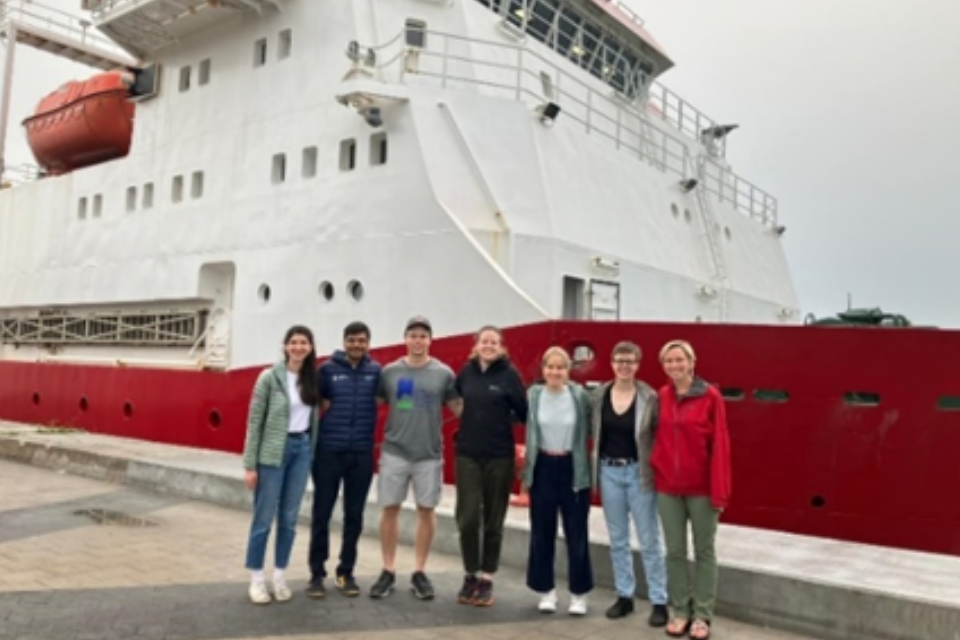HMS Protector “Sea Rider” Expedition for Early-Career Researchers

Summary
The UK and Canada have an exciting portfolio of collaborative projects relating to science, technology, and research. This includes ongoing collaboration on Arctic science under the flagship Canada-Inuit Nunangat-United Kingdom Arctic Research Programme – CINUK. Though the UK is not an Arctic nation, we are committed to working with our Arctic partners and allies to protect and better understand this fascinating and rapidly changing environment. We are committed to maximising opportunities for young people to get involved in SIN-related programming, and to provide equal opportunities to groups that are often underrepresented in STEM fields.
In collaboration with the Royal Navy, the British Antarctic Survey (BAS), and UK Research and Innovation (UKRI), the British High Commission in Ottawa organised a one-week expedition for a select group of British and Canadian early-career researchers (ECRs) to travel on board HMS Protector, the Royal Navy’s ice patrol ship. This project targeted ECRs hoping to become polar researchers.
Opportunities for graduate students to get involved in ship-based field research are extremely limited due to the cost, logistical difficulty, and the tight capacity of research vessels for expeditions. This trip provided a rare opportunity for participants to get a taste of life at sea on board an ice capable vessel.
Impact
Julie Galloway, Ottawa based SIN Officer, developed and facilitated the programme. After advertising the opportunity widely, we received over 200 applications — greatly exceeding expectations. Applications were reviewed by an expert panel that ultimately selected a group of six ECRs: three from the UK, and three from Canada (with two researchers from indigenous backgrounds). The research interests included chemistry, atmospheric science, glaciology, microbiology, and ecology.
The expedition began in Quebec City, Quebec (9 July) ending in St John’s, Newfoundland (17 July). ECRs engaged in learning and development sessions with the ship’s engineers, hydrologists, navigators, and sailors, which gave the ECRs the opportunity to experience the breadth of work that takes place on a Royal Navy ship. The ECRs presented their own research to the ship’s crew, allowing them to share knowledge and hone their presentation skills. Another key highlight for the ECRs was the many opportunities to watch for local wildlife (e.g. seabirds and marine mammals).
ECRs had the opportunity to hear from Ms Theresa Gossmann, from British Antarctic Survey (BAS) (and current lab manager on board the RRS Sir David Attenborough), who joined the group as a scientific lead. Theresa had a wealth of experience to share about her time working in Antarctica, and taught sessions on how to prepare for a polar field season, gave a demonstration of the BAS kit bag for field work in extreme environments, and introduced Marine Mammal Observer training.
The program also included trips ashore to Québec City, where the ECRs met with two polar scientists from Université Laval: Dr. Philippe Archambault (Scientific Director of ArcticNet, a Canadian Arctic research network) and Dr. Frédéric Maps. Likewise, in St. John’s, academics from the Marine Institute at the Memorial University of Newfoundland provided a full tour of their research facilities and hosted a visit to the Centre for Marine Simulation (pictured right). Giving ECRs the opportunity to try their hand at piloting an icebreaker vessel on the simulator.
Next Steps
The HMS Protector “Sea Rider” programme was a unique collaboration between SIN and the Royal Navy, and we hope that this project will be the backbone for similar projects into the future. It highlighted the scientific capabilities of the Royal Navy and promoted UK excellence on an international stage. It gave opportunities for the SIN team to engage with academics in eastern Canada, and to mobilise ECRs from both countries who will hopefully go on to lead successful careers in polar science. According to Jocelyn Plouffe, one of the participants in the programme, “Joining HMS Protector as an early career scientist in polar research was an incredible opportunity, made unforgettable by the warmth and camaraderie of the crew and fellow scientists. The welcoming atmosphere and the chance to network with experts in the field made for a truly enjoyable experience with the exciting potential for future scientific collaborations.”
The UK and Canada have ongoing bilateral partnerships on polar research, namely through the Canada-Inuit Nunangat-United Kingdom Arctic research (CINUK) programme. However, as the five-year CINUK programme is soon ending, this is the time to demonstrate the value and necessity of these bilateral relationships.
SIN Officer Contact: Julie Galloway (julie.galloway@fcdo.gov.uk)
Related
Llyods Recruiting Engineers In India After Slashing Jobs In UK
Lloyds Banking Group is planning to hire hundreds of engineers in India as the company plans to shift its employment opportunit
Major new funding for music acts that supercharged careers of…
£1.6m Music Export Growth Scheme to support 58 independent UK artists to tour the world Funding will boost UK’s creative industries – a key growth se
Well-loved restaurant chain to close 8 venues across UK as…
A BELOVED restaurant chain has announced it will close eight venues across the UK, scrapping 158 jobs in the process.Owners are pointing the finger at Labour's
US adds 151,000 jobs in February as unemployment rate ticks…
The latest figures published by the US Bureau of Labor Statistics today (7 March) came in below market expectations, with economists polled by












